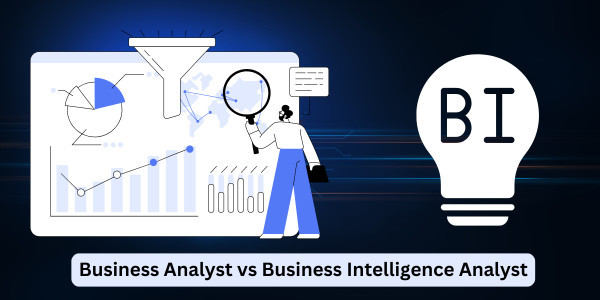Business Analyst vs Business Intelligence Analyst – In the ever-evolving world of business, roles and job titles can often seem confusing, especially when they appear to overlap in function. Two such roles that are frequently confused are that of the Business Analyst (BA) and the Business Intelligence Analyst (BIA). While both positions are integral to a company’s success, they focus on different aspects of business operations and require distinct skill sets.
In this article, we’ll explore the key differences between a Business Analyst and a Business Intelligence Analyst, and help you determine which career path might be right for you.
Understanding the Roles: What Does a Business Analyst Do?
A Business Analyst (BA) is crucial in identifying business needs and finding solutions to business problems. BAs bridge business stakeholders and the IT department, ensuring that technology solutions align with business goals. They are often involved in project management, requirement gathering, and process improvement.
Core Responsibilities of a Business Analyst
- Requirement Gathering: BAs work closely with stakeholders to understand their needs and translate these into functional requirements for the IT team.
- Process Improvement: They analyze existing business processes and recommend improvements to increase efficiency and effectiveness.
- Project Management: BAs may take on project management duties, ensuring that projects are delivered on time and meet the business’s needs.
- Stakeholder Communication: They maintain constant communication with stakeholders to ensure that everyone is on the same page regarding project goals and progress.
Understanding the Roles: What Does a Business Intelligence Analyst Do?
On the other hand, a Business Intelligence Analyst (BIA) is primarily focused on data. BIAs use data to help businesses make informed decisions. They collect, analyze, and interpret data from various sources to provide actionable insights that can drive business strategies.
Core Responsibilities of a Business Intelligence Analyst
- Data Collection: BIAs gather data from multiple sources, such as databases, spreadsheets, and external sources.
- Data Analysis: They analyze this data to identify trends, patterns, and anomalies that can inform business decisions.
- Reporting: BIAs create reports and dashboards that present data in a clear and actionable way for business leaders.
- Strategic Decision-Making: They provide insights that help businesses develop strategies, optimize operations, and improve performance.
Key Differences Between a Business Analyst and a Business Intelligence Analyst
While the roles of a BA and a BIA may seem similar, especially since both involve analysis, their focus areas are quite distinct.
| Criteria | Business Analyst (BA) | Business Intelligence Analyst (BIA) |
|---|---|---|
| Primary Focus | Business processes, requirements, and solutions | Data analysis and providing actionable insights |
| Core Responsibilities | Requirement gathering, process improvement, project management, stakeholder communication | Data collection, data analysis, reporting, strategic decision-making |
| Key Skills | Communication, project management, process modeling, requirement analysis | Analytical skills, proficiency in data analysis tools, data interpretation |
| Tools Used | Microsoft Excel, Visio, project management software (e.g., JIRA, Trello) | SQL, Excel, Tableau, Power BI, Python, R |
| Outcome/Deliverables | Project requirements documents, process flow diagrams, business cases | Data reports, dashboards, insights for decision-making |
| Career Path | Senior Business Analyst, Product Manager, COO | Senior BI Analyst, Data Scientist, CDO |
| Educational Background | Business Administration, Management, or related fields | Data Science, Computer Science, Statistics, or related fields |
| Typical Industries | Finance, healthcare, technology, consulting | Finance, healthcare, technology, retail, consulting |
| Work Environment | Collaborates with stakeholders, IT teams, and project managers | Works closely with data teams, business leaders, data scientists |
| Data Interaction | Uses data to support business process improvements | Directly interacts with large datasets to extract insights |
| Coding Requirements | Typically minimal, focused more on business processes | Often required, especially with SQL and data analysis scripts |
1. Focus Areas
- Business Analyst: The primary focus is on understanding business processes, requirements, and problems to find solutions that improve business efficiency.
- Business Intelligence Analyst: The main focus is on data analysis to provide insights that help in strategic decision-making.
2. Skill Sets
- Business Analyst: Requires strong communication skills, knowledge of business processes, and the ability to work closely with stakeholders. BAs often need to be skilled in project management, process modeling, and requirement analysis.
- Business Intelligence Analyst: Needs strong analytical skills, proficiency in data analysis tools (like SQL, Excel, and BI tools such as Tableau or Power BI), and the ability to interpret complex data sets. BIAs should also be comfortable working with large datasets and possess a deep understanding of data warehousing and mining.
3. Tools Used
- Business Analyst: Typically uses tools like Microsoft Excel, Visio, and project management software (such as JIRA or Trello) to manage requirements and processes.
- Business Intelligence Analyst: Utilizes data analytics tools like SQL, Python, R, Tableau, Power BI, and other data visualization and reporting tools.
4. Outcome and Deliverables
- Business Analyst: Delivers project requirements documents, process flow diagrams, and business cases.
- Business Intelligence Analyst: Delivers data reports, dashboards, and insights that inform business decisions.
Career Path and Opportunities
Business Analyst Career Path
The career path for a Business Analyst can lead to roles such as Senior Business Analyst, Product Manager, or even Chief Operations Officer (COO). BAs often move into management roles where they oversee larger teams and projects.
Business Intelligence Analyst Career Path
A Business Intelligence Analyst can advance to positions like Senior BI Analyst, Data Scientist, or Chief Data Officer (CDO). BIAs often transition into more specialized data roles, focusing on advanced analytics and big data.
Which Role Is Right for You?
Choosing between a career as a Business Analyst or a Business Intelligence Analyst depends on your interests and skills. If you enjoy working with people, understanding business needs, and finding solutions to improve processes, a career as a Business Analyst might be the right fit. However, if you have a passion for data, enjoy digging into numbers, and providing insights that drive business decisions, a Business Intelligence Analyst role may be more suitable.
Conclusion
In summary, while both Business Analysts and Business Intelligence Analysts play crucial roles in helping businesses thrive, they do so in different ways. Business Analysts focus on understanding and improving business processes, while Business Intelligence Analysts concentrate on using data to inform strategic decisions. Understanding these differences can help you choose the career path that aligns best with your skills and interests.
FAQs
1. Can a Business Analyst transition to a Business Intelligence Analyst role? Yes, a Business Analyst can transition to a Business Intelligence Analyst role, especially if they develop strong data analysis skills and gain experience with data tools.
2. What qualifications are needed to become a Business Intelligence Analyst? A degree in a related field such as Computer Science, Data Science, or Statistics is often required. Proficiency in data analysis tools like SQL, Python, and BI software is also essential.
3. Do Business Intelligence Analysts need to code? While not all Business Intelligence Analysts need to code, knowing SQL, Python, or R can be highly beneficial for data analysis tasks.
4. Which role has a higher earning potential? Earning potential can vary based on experience, location, and industry. However, roles in data science and analytics, including Business Intelligence Analysts, often command higher salaries.
5. What industries hire Business Analysts and Business Intelligence Analysts? Both roles are in demand across various industries, including finance, healthcare, technology, retail, and consulting.
Also, Useful Links:
Business Analyst Training Course Online Request Demo











